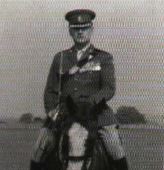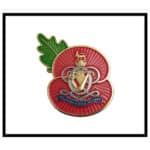He was brave, resolute, honourable and true. He was devoted to his family, his friends, his Regiment, the whole British Army and his country. He was a real patriot. He was every inch a soldier.

Yet beneath the sometimes stern, martial exterior beat a heart capable of great affection. He was something a legend in his own lifetime, not only in the British Army but in the Australian Army too.
In Australia, you will find that most of the recent Chiefs of General Staff and many former State Governors were taught by John at Duntroon.
His knowledge of our own Army was astonishing, and frequently when he and I were with an officer of another regiment, it soon became clear that John knew more about this other regiment than the man who belonged to it.
He was a great raconteur and his many colourful stories usually featured him as either hero or villain. All of us have greatly enjoyed listening to some of his outlandish tales – even at the risk of hearing them more than once. He had a great sense of humour, which he sometimes exercised at the expense of others – notably senior officers – but always in a spirit of leg-pulling, never of malice.
He liked to hold the centre of the stage, and I remember well that shortly after he joined the 4th Hussars in mid-1943 – he had previously served with Skinner’s Horse – he played one of his tricks which went mildly astray.
Having just completed his first duty as an orderly officer, he reported to the adjutant that he had not been satisfied with his own conduct of this duty and therefore requested an extra orderly officer duty. But the adjutant, John Downes, was quick to see through this bid for eccentricity and replied that the Regiment could be more generous and therefore awarded John a week’s extra duty.
It was very fortunate for me that John joined ‘C’ Squadron, commanded first by Peter Crichton, then Jack White, so that we became fellow troop leaders and firm friends. In those days at Beni Yusef where we were re-equipping with Sherman tanks, the military day was usually over by midday and we would then repair to Gezirah Sporting Club in Cairo for some sporting activity.
Not John. He seemed to have acquired bad habits with the Indian Army, and instead of Gezirah, he would retire to his tent in order to practise what was known as Egyptian PT or studying for the Staff College.
John was longing to get into action against the Wehrmacht, and before long we found ourselves in Italy as the armoured reconnaissance regiment of the 1st Armoured Division. In the summer of 1944, it was decided that this division would break through the Gothic Line and advance with the 8th Army to Venice
and Vienna.
Vain hope! ‘C’ Squadron was in the lead for this grand idea, with John and me as the leading troops. We came up against the hard nut of Coriano, and after some ten days of hard battling during which the 4th Hussars lost nine officers, 35 men and nine tanks, we withdrew for a few days’ rest. Almost at once, John asked me whether I was not simply aching to get back into action.
In fact, I was rather enjoying being dry and warm in a farmhouse, but I felt out of loyalty that I had to express my total eagerness to have another crack at the foe. We did and it was during another scrappy action against the brave and skilful German Panzer and parachute troops that John distinguished
himself and was awarded the Military Cross.
John loved talking so it was just as well there were few languages which he did not speak. Fluent in Greek – his mother tongue – French, German, Italian, Swedish, Urdu, Gurkhali and of course Arabic, whose complexities of pronunciation he was well able to master.
He had needed to at one time during his command of the Abu Dhabi Defence Force, for he was landed with a full-scale, mutinous refusal of duty by one regiment and it required all his fluency and persuasion to set things right.
While an absolute stickler for carrying out his own duties, there were times when he made it plain that he did not support the line of action recommended. In those splendid days at Hohne, he was my 2IC when I was commanding ‘C’ Squadron, and on more than one occasion when I had issued instructions to him, he complied but with the proviso: ‘Well, Sir, if that is your order’, implying that he had rarely heard a less sensible one.
In those days at Bredebeck we had wonderful times with all the horses, and apart from early morning hacks and riding school under the expert instruction of Stephen Eve and the inspiring example of Loopy Kennard, John and I took part in numerous hunter trials and show jumping events. He had then a mare called Dora, tough, up to John’s weight and a great goer when roused.
John’s military career was both varied and distinguished. In war, he proved himself a fine leader and a most effective trainer of others. Later he served in Malaya until misfortune – in the form of plunging into a pig-trap while on patrol in the jungle – obliged him to return to England because of a damaged back.
Before going, however, he was briefly in a Kuala Lumpur hospital, where he found himself in the next bed to David Walder, who later became a great member of the regiment. David had been wounded in the stomach and forbidden to laugh. But John embarked on his stories and David had to be moved to another ward.
John was an inspiring Squadron leader in Sharjah and Borneo, and eventually took over command of the Regiment from me at Wolfenblittel. Before leaving Libya, however, he had despatched a Libyan desert cat, called Marcus Aurelius, to Hanover airport for us to collect. At first, the airport officials refused to release the animal, but after it had savaged several of them they pleaded for its removal. He then became the terror of Hasenwinkel where the officers’ married quarters were.
Even John’s most ardent admirers would have to concede that administration was not his strong point, and his adjutant, Rodney Martin, had difficulty in persuading him to deal with the various bits of a paper set before him.
John was blessed with a wonderful wife and two highly accomplished, intelligent, likeable and comely children. It was of infinite satisfaction to him that Richard became a most popular and respected member of the Regiment, and that Charlotta enjoyed so happy and successful a marriage.
After two final appointments – command of the Gunnery School at Lulworth and Commander, Salisbury Plain as a Brigadier, John retired from the Army, but only to serve it most valuably as Schools Liaison Officer, so ensuring that a stream of suitable young men reinforced both our own Regiment and many
others.
Wherever John went, whether Maiden Bradley or Sutton Veny, he made an instant and enduring impression. He was a great supporter of the Royal British Legion and he and I enjoyed many days fence-judging at various hunter trials.
John was wedded to the ideals of duty, service, straightforwardness and honourable behaviour. He disliked intensely all forms of ill-discipline, disloyalty, dishonesty, shabby behaviour, and disrespect. He himself set a fine example of how to conduct oneself. In his command of troops, both in war and peace, he won golden opinions from all sorts of people.
All who knew him liked and admired him. He was a model of what a British officer and gentleman should be. And he brought a lot of enjoyment and laughter to the lives of many of us.
John’s last years were clouded over with vascular dementia, but softened by the love and care of Richard and Charlotta and Charlotta’s children. And from time to time during my own visits to him in Amesbury Abbey, I would touch a chord of memory: either some event of the past, recollection of a mutual friend or reference to the Regiment’s doings and darings, and then the smile and spark would appear and his spoken response would tell me that he remembered whatever it was.
He will always figure in the Regiment’s history as one of its outstanding members. Who else, after all, would have had the presence of mind and wit – when faced with a dangerously slipping saddle during an inspection, which he was carrying out mounted, to have called out as he made his way off the parade ground: ‘Arrest my groom!’
When today I contemplate John Paley’s character and achievements, I see a man of great integrity, overflowing with a deep sense of duty, humour, love of soldiering, the consciousness of and pride in the British Army’s record of gallantry and perseverance, a true cavalryman, devote to his Regiment and
his fellow comrades-in-arms, with the gift of true friendship, and a never-ending stream of improbable, yet diverting, stories.
He was, as I said earlier, a legend in his own lifetime, a born leader, a real regimental soldier with a dearly- loved family and a host of friends and admirers. He shared my love of Shakespeare, and would I believe have recognized these two lines with which I complete my tribute to him :
He was a man, take him for all in all, I shall not look upon his like again.



